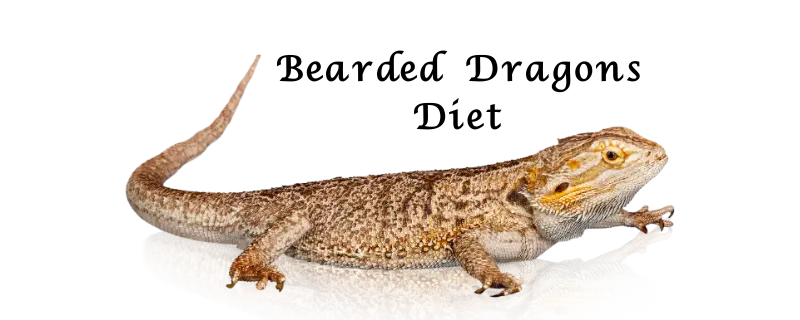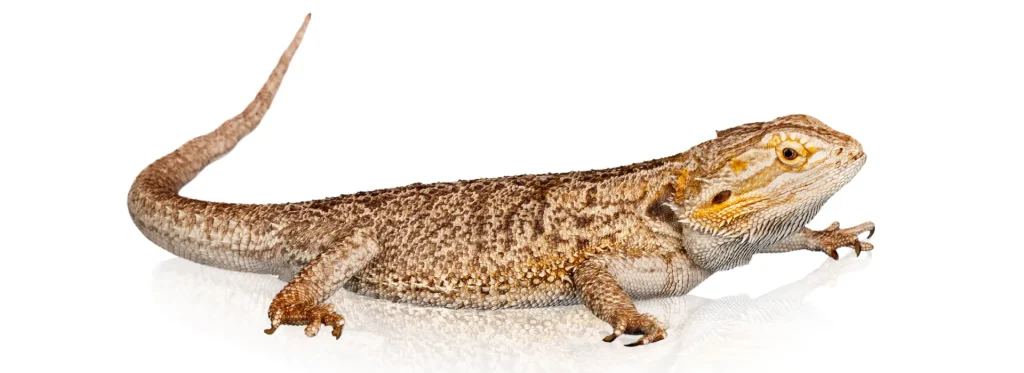
The Complete Bearded Dragons Diet Plan
Bearded dragons are interesting pets with calm personalities and a unique look. To keep them healthy, it’s important to know what they should eat. Their diet includes a mix of live insects, vegetables, and sometimes fruits. In this article, we’ll discuss what bearded dragons eat, how to give them a balanced diet, and tips for feeding them. Whether you’re new to owning a bearded dragon or just want to improve your meals, this guide will help you make sure your pet stays healthy and happy.
What do bearded dragons eat?
Bearded dragons are fascinating creatures with diverse dietary needs. As omnivores, they enjoy a wide range of foods, including insects, fruits, vegetables, and even small vertebrates like rodents or lizards. In their natural habitat, bearded dragons are quite active, spending their days climbing, foraging, and basking under the sun. This active lifestyle means they consume a substantial amount of food, particularly insects, to sustain their energy levels.
However, domesticated bearded dragons lead a more sedentary lifestyle, often confined to smaller spaces with less opportunity for exercise. This reduced activity makes it crucial to monitor their diet carefully to avoid obesity—a common issue in captive dragons. Your bearded dragon may have a healthy appetite, but it’s essential to regulate their food intake to ensure they maintain an ideal weight.
A balanced diet is key to your dragon’s health. Adult bearded dragons typically require a diet composed of about 80% plant-based foods and 20% insects. For younger dragons, the ratio can vary, with diets ranging from 80% insects to a 50-50 split between insects and plants. Since dietary needs can vary, it’s always best to consult with a veterinarian to tailor the diet to your specific dragon.
What fruits can bearded dragons eat?
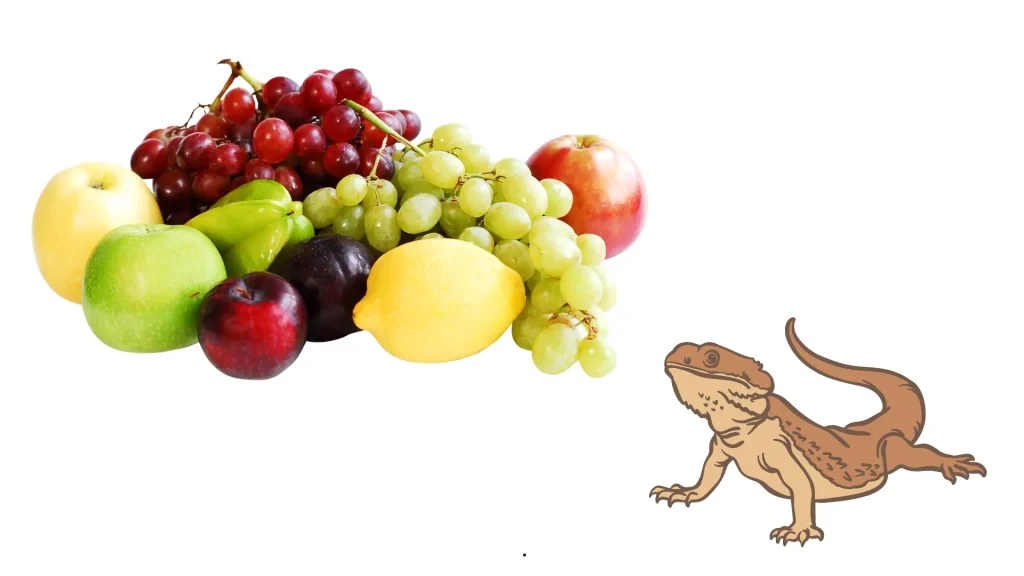
Bearded dragons can eat a variety of fruits, but only in small amounts. Fruit should make up about 10-20% of their diet, and it’s important to cut it into small pieces. Avoid feeding them citrus fruits as they are too acidic. Here are some safe and tasty fruits for your bearded dragon:
In addition to fruits, your bearded dragon can enjoy some edible flowers like dandelions, hibiscus, roses, carnations, geraniums, and nasturtiums. These are also good for variety and nutrition.
What Vegetables Can Bearded Dragons Eat?
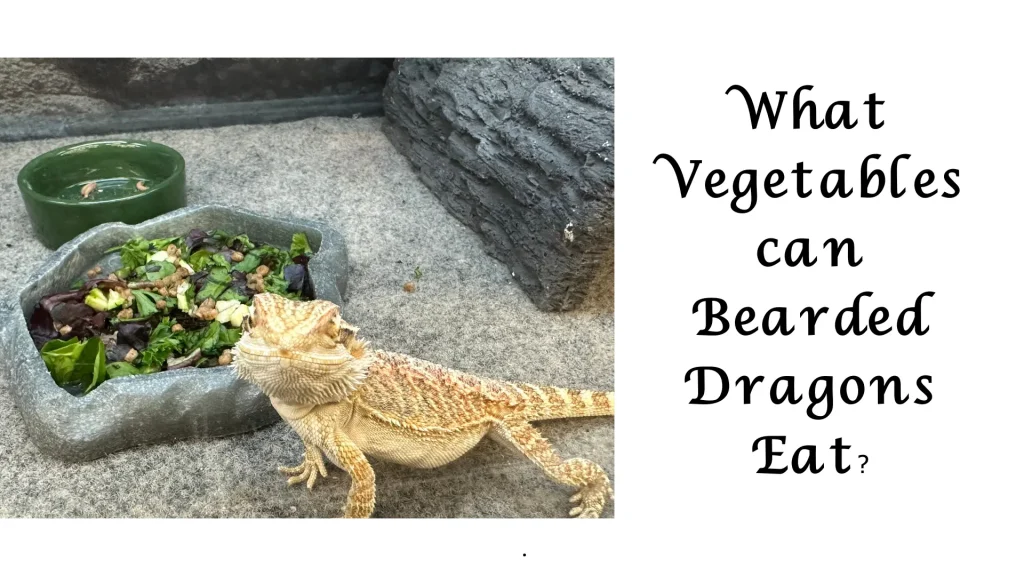
Feeding vegetables to your bearded dragon is a great way to give them a balanced and nutritious diet. The good news is that beardies can eat as many vegetables as they want without gaining too much weight.
Tip: Even if your baby bearded dragon doesn’t seem to like veggies at first, keep offering them. They’ll get used to them over time.
Around 80-90% of your dragon’s diet should be vegetables, with a focus on dark green, leafy ones.
Vegetables safe for regular feeding:
Vegetables for occasional treats (once a month or so):
Vegetables to avoid:
What Bugs Can Bearded Dragons Eat?
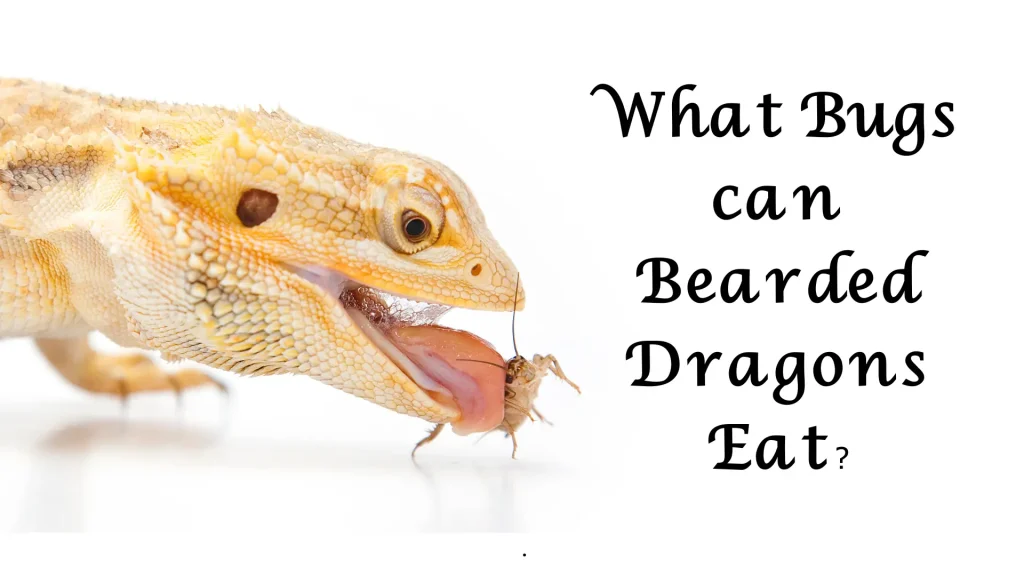
Bearded dragons are known to enjoy eating live bugs, which can make feeding time both entertaining and essential for their health. Among the most common insects fed to pet dragons are roaches, crickets, and various types of worms. It’s important to choose one primary feeder insect that will serve as the main source of protein for your dragon while supplementing with a variety of other bugs to ensure they receive a well-rounded diet of nutrients.
Pro Tip: Always feed your dragon insects that are roughly the same size as the space between their eyes to avoid choking or digestive issues.
Crickets
Crickets are one of the most popular choices for feeding bearded dragons. These insects are rich in both protein and calcium, making them a nutritious snack. They are widely available in pet stores, but they can be noisy and have a tendency to escape. If you choose to feed crickets to your dragon, ensure they are stored securely and away from areas where the noise could be a nuisance.
Dubia Roaches
Dubia roaches are highly recommended for bearded dragons due to their low-fat content and exceptionally high protein levels—up to five times more nutritional value than other live insects. These roaches are quiet, cannot climb or fly, and do not pose a risk of infestation if they escape. Additionally, they do not bite or produce unpleasant odors, making them a convenient and healthy choice for your pet.
Worms
The World of Worms offers many safe and nutritious options for your bearded dragon. Some worms are more nutrient-dense than others, while some serve as occasional treats. Below are some common types of worms that can be fed to your dragon:
Insects to Avoid
Certain insects can be harmful or even poisonous to your bearded dragon. Avoid feeding them:
Pro Tip: Always purchase insects from a reliable pet food source to ensure they are free from pesticides and other harmful substances. Make sure the insects have been fed a nutrient-rich diet, as these nutrients will be passed on to your dragon.
By carefully selecting the right insects and following these guidelines, you can help ensure that your bearded dragon remains healthy and happy.
Best Supplements for Bearded Dragons
Bearded dragons, like humans, thrive with a balanced intake of vitamins and minerals. To ensure your pet remains healthy and vibrant, incorporating supplements into their diet is crucial. Below are some of the most highly recommended supplements for bearded dragons:
Calcium Supplements
Calcium is arguably the most vital supplement for bearded dragons. It plays a key role in maintaining strong bones and preventing metabolic bone disease, a condition often resulting from calcium deficiency. It’s essential to provide a calcium supplement regularly. Our Reptile Greens & Calcium Powder is an excellent choice to support your bearded dragon’s health and well-being.
Vitamin D3
Vitamin D3 is another critical supplement, especially when considering calcium. In their natural habitat, bearded dragons obtain Vitamin D3 from sunlight, which helps them absorb calcium effectively. However, in domestic settings, your dragon may not get enough natural sunlight. Therefore, selecting a calcium supplement that also includes Vitamin D3 can be beneficial. This helps ensure that your dragon can utilize the calcium effectively, promoting better bone health.
Multivitamins
In addition to calcium and Vitamin D3, multivitamins can be a valuable addition to your bearded dragon’s diet. These supplements provide a broad range of essential nutrients that might not be fully covered by their regular diet. Consulting with your veterinarian is advisable to determine the specific multivitamin needs of your dragon, as their requirements can vary based on their health, age, and diet.
By incorporating these supplements into your bearded dragon’s diet, you can help maintain their overall health and vitality. Always remember to consult with a veterinarian to tailor the supplements to your pet’s individual needs and ensure they receive the best care possible.
Feeding Guidelines
Feeding Guidelines for Your Bearded Dragon
Feeding your bearded dragon is crucial for its health and growth. Whether you have a baby, juvenile, or adult dragon, here are some simple tips to ensure you’re providing the best care:
Tips for Feeding Your Baby Bearded Dragon
Tips for Feeding Your Adult Bearded Dragon
General Feeding Tips
For bearded dragons of all ages, it’s important to offer a varied diet that includes nutrient-rich insects, vegetables, and fruits. Providing a balanced diet will help maintain their health, happiness, and overall quality of life. Always ensure that the food offered is fresh and suitable for their age and size.
By following these guidelines, you can help your bearded dragon thrive and enjoy a healthy, happy life.
FAQs
How long can a bearded dragon go without eating?
Bearded dragons can typically go without food for about 1-2 weeks, depending on their age, health, and condition. Young or sick bearded dragons might need to eat more frequently and may not handle fasting as well as healthy adults. It’s essential to monitor their behavior and health closely if they refuse food for an extended period and consult a vet if needed.
Can bearded dragons eat fruits and vegetables every day?
Yes, vegetables should be offered daily, while fruits should be given sparingly as treats due to their high sugar content.
Can bearded dragons eat live food?
Yes, live food is beneficial for their mental stimulation and hunting instincts.
How can I tell if my bearded dragon is not eating enough?
Signs of inadequate food intake include weight loss, lethargy, and changes in behavior.
About Author
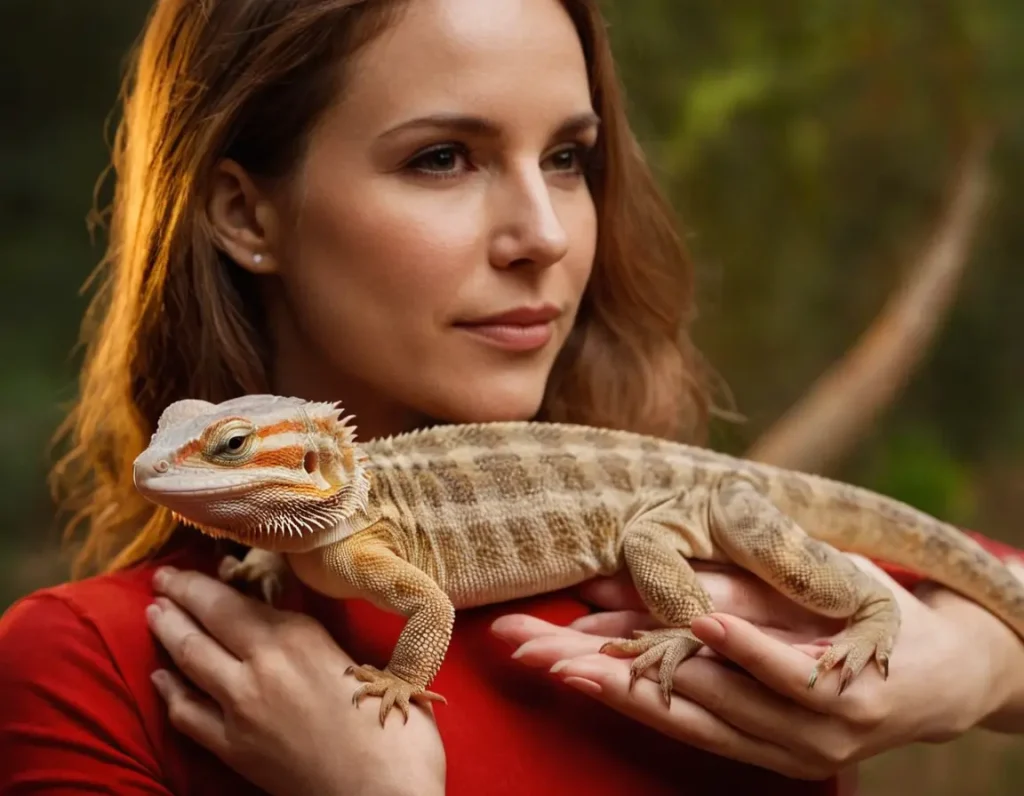
Hi, I’m Dr. Luca, the creator of BeardedDragonsDiet.com. With 25 years of experience caring for bearded dragons, I started this site to share my knowledge and help others take better care of their pets, especially when it comes to feeding them. My goal is to provide simple, helpful tips, whether you’re new to owning a bearded dragon or have had one for years.
